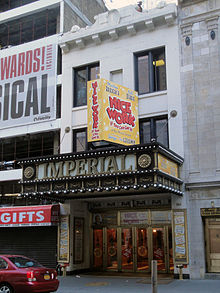Imperial Theatre
The Shubert Organization's fiftieth venue in New York City, the Imperial was constructed in 1923 to replace the outdated Lyric Theatre.The Imperial Theatre is on 249 West 45th Street, on the north sidewalk between Eighth Avenue and Broadway, near Times Square in the Theater District of Midtown Manhattan in New York City.[23] A passageway from the 45th Street entrance, measuring 20 feet (6.1 m) wide,[18] leads to a promenade at the rear (west) end of the orchestra.[17] The orchestra promenade has a pair of columns topped by Tuscan-style capitals, as well as a paneled ceiling with bands in the Adam style.[20] The rest of the ceiling contains a slight curve and shallow coves, which were intended to give the theater an intimate feeling.[33] The site was acquired by A. H. Pincus and M. L. Goldstone,[11][6] who in November 1922 began planning for a two-story office and three-story theater.[34] L. & A. Pincus helped finance the construction, along with the Shuberts and the 45th Street Leasing Company Inc.[4] The Imperial Theatre was not named as such until December 1923, a few weeks before its opening.[39][40] Another Oscar Hammerstein II score was featured in Rudolf Friml's operetta Rose-Marie, which opened that September[41][42] and eventually staged over 500 performances.[35][45][a] The Shuberts proposed expanding the Imperial in 1925, incorporating it into the base of an 15-story residential building designed by Krapp, but this never occurred.[48][49] The same year, the Imperial staged Oh, Kay!, featuring Victor Moore and Gertrude Lawrence with music from George and Ira Gershwin.[22] The musical Sons o' Guns opened in November 1929 with Lili Damita;[55][56] it ran 297 performances in spite of the onset of the Great Depression.[57][58] The 1930s began with some short runs,[59] but the Imperial still hosted several successful shows despite the Shuberts' Depression-era financial troubles.[33] Ed Wynn staged the vaudeville-style The Laugh Parade in 1931,[60][61][62] while Howard Dietz and Arthur Schwartz had a successful score the next year in the musical Flying Colors.[99][100] A transfer of the long-running Rosalinda from the 44th Street Theatre followed in 1943,[94][101] and the Kurt Weill and Ogden Nash musical One Touch of Venus premiered the same year with Mary Martin.[106] The largest of those was the musical Annie Get Your Gun, featuring Ethel Merman with a score by Berlin, which opened in 1946[106][107] and ran 1,147 performances.[106][108][109] The run of Annie Get Your Gun was suspended temporarily in 1946 after the weight of the musical's set caused one of the theater's beams to warp.[114][115] In 1950, the Imperial hosted Peter Pan, featuring Jean Arthur and Boris Karloff with a score by Leonard Bernstein.[120][121] Wish You Were Here premiered in 1952,[118][122] running 598 performances,[120][123] with a set that included a fully functional swimming pool on the Imperial's stage.[118][131][132] By then, the Shuberts owned the Imperial again, but they operated nearly half of all legitimate theaters in New York City at the time, prompting the U.S. federal government to file an antitrust suit against the firm.As part of a settlement made in February 1956, they chose to sell their St. James Theatre, since they would have otherwise been forced to lease the Imperial or the St.[133] The Imperial also hosted the 1957 musical Jamaica, starring Lena Horne and Ricardo Montalbán with a score by Harold Arlen and E. Y. Harburg,[134][135][136] and the 1959 musical Destry Rides Again, starring Dolores Gray and Andy Griffith with a score by Harold Rome and Leonard Gershe.[151][152] Fiddler, which featured Zero Mostel with a score by Jerry Bock, Joseph Stein, and Sheldon Harnick, stayed for nearly three years before it transferred as well.[208][209] Les Misérables was the second-longest-running Broadway production ever when it closed in 2003;[210] the closure was partially attributed to reductions in ticket sales caused by the September 11 attacks in 2001.[212][213] As part of a settlement with the United States Department of Justice in 2003, the Shuberts agreed to improve disabled access at their 16 landmarked Broadway theaters, including the Imperial.[15][16] American Idol season 2 competitors Ruben Studdard and Clay Aiken performed at the Imperial for a Christmas special in 2018,[219][220] and the musical Ain't Too Proud opened in March 2019.[221][222] Ain't Too Proud achieved the box office record for the Imperial Theatre, grossing $1,865,016.90 over eight performances for the week ending December 29, 2019.[228] The Imperial's next production, Andrew Lloyd Webber's musical Bad Cinderella, opened in March 2023[229][230] and closed that June.





Imperial TheaterManhattanNew York CityUnited StatesCoordinatesThe Shubert OrganizationBroadwayCapacityHerbert J. KrappNew York City LandmarkGeorge Abbott WayTheater DistrictMidtown ManhattanShubert brothersNew York City designated landmarkfacadeterracottaAdam-styleprosceniumsounding boardLyric TheatreMary Jane McKaneAnnie Get Your GunFiddler on the RoofDreamgirlsThe Mystery of Edwin DroodLes MisérablesBilly Elliot the MusicalChapter TwoEighth AvenueTimes Squareland lotfrontageRichard Rodgers TheatreMusic Box TheatreNew York Marriott MarquisParamount HotelLena Horne TheatreHotel EdisonLunt-Fontanne TheatreOne Astor PlazaGerald SchoenfeldShubertBroadhurst TheatresMajesticBernard B. JacobsJohn Golden TheatresAstor familyNew York metropolitan areaKlaw TheatreAmbassador TheatreRitz (now Walter Kerr) TheatreMoroscoreliefThe Broadway LeaguePlaybillorchestra pitAdam stylewainscotingcapitalsfriezepilasterssegmentally archedbas-reliefscornicemodillionslatticeworkthe Great DepressionSyracuse, New YorkdownstateArthur HammersteinVincent YoumansOscar Hammerstein IIOscar Hammerstein IMary HayMoscow Art TheatreRudolf FrimlRose-MarieHammerstein's TheatreOh, Kay!Victor MooreGertrude LawrenceGeorgeIra GershwinSigmund RombergThe New MoonLili DamitaEd WynnHoward DietzArthur SchwartzFlying ColorsGeorge S. KaufmanMorrie RyskindOf Thee I SingLet 'Em Eat CakeSay WhenJubileeOn Your ToesLeslie HowardHamletfloppedBetween the DevilCole PorterLeave It to Me!Mary MartinRichard RodgersLorenz HartToo Many GirlsIrving BerlinLouisiana PurchaseHerbertDorothy FieldsLet's Face It!44th Street TheatreKurt WeillOgden NashOne Touch of VenusZiegfeld FolliesEthel MermanRobert E. SherwoodMiss LibertyPeter PanJean ArthurBoris KarloffLeonard BernsteinCall Me Madam